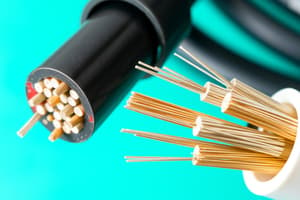Podcast
Questions and Answers
What are the three main qualities that an insulating material for a cable should have?
What are the three main qualities that an insulating material for a cable should have?
- High cost, high dielectric strength, low mechanical strength
- High cost, low dielectric strength, low mechanical strength
- Low cost, low dielectric strength, low mechanical strength
- Low cost, high dielectric strength, high mechanical strength (correct)
What is the purpose of armouring in a cable?
What is the purpose of armouring in a cable?
- To prevent electrical interference
- To improve conductivity
- To protect against mechanical injury (correct)
- To protect against moisture
Which of the following materials can be used as insulation in cables?
Which of the following materials can be used as insulation in cables?
- Wood
- Glass
- Metal
- Rubber (correct)
What determines the thickness of the insulation layer on a cable conductor?
What determines the thickness of the insulation layer on a cable conductor?
What are the three qualities that the insulating material for a cable should be?
What are the three qualities that the insulating material for a cable should be?
What does PVC stand for?
What does PVC stand for?
What is the purpose of a sheath in a cable?
What is the purpose of a sheath in a cable?
What type of conductor is commonly used in cables?
What type of conductor is commonly used in cables?
What factors affect the breakdown voltage of a cable?
What factors affect the breakdown voltage of a cable?
What are AAC, AAAC, and ACSR?
What are AAC, AAAC, and ACSR?
Flashcards are hidden until you start studying
Study Notes
- Insulating material for a cable should have low cost, high dielectric strength, and high mechanical strength.
- Armouring protects a cable against mechanical injury.
- Any of the insulation materials such as varnished cambric, rubber, or paper can be used in cables.
- The thickness of the layer of insulation on the conductor depends upon voltage and current carrying capacity.
- The insulating material for cables should be acid proof, non-inflammable, and non-hygroscopic.
- PVC stands for polyvinyl chloride.
- Sheaths are used to prevent moisture from entering the cable, while intersheaths provide proper stress distribution.
- Copper is used as an annealed conductor for cables.
- The breakdown voltage of a cable depends on the presence of moisture, working temperature, and time of application of the voltage.
- AAC, AAAC, and ACSR are part of a family of overhead conductors.
Studying That Suits You
Use AI to generate personalized quizzes and flashcards to suit your learning preferences.




